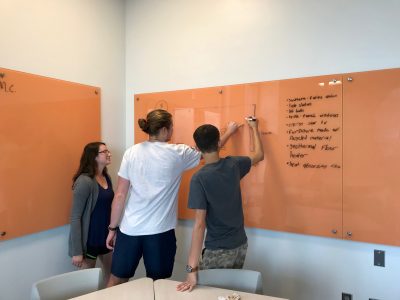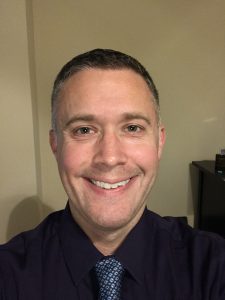Post contributed by Christopher T. Wyckoff, Ph.D., Assistant Director, First Year Experience
I’ve always had an interest in and passion for the environment. One of my most vivid memories is from my childhood, on a chilly spring day in Chicago. I decided to button up my coat, jump on my Big Wheel, and race around our house. After having cornered a bit too tightly, I looked back and – to my horror – saw the carnage I’d caused in my mother’s tulip bed. Panicked, I did what any seven-year old would do: I ran inside, grabbed the tape dispenser, and taped all of the broken-off flowers back onto their stems. Obviously, I did this to avoid my mother’s ire, but I also suffered a deep feeling of regret at having destroyed a bit of nature – a flower bed that celebrated the last of the melting snow and the reemergence of color after a dreary Midwestern winter.
My desire to celebrate and improve the natural environment endures. I became an educator in part because of my belief that I could be satisfied in my life by helping others improve their own. I was raised in a community that values giving back with heart, which was my intention when I began my work at Auburn in 2004. I quickly found myself involved with the Parkerson Mill Creek restoration project, which was then in its infancy. As the advisor for IMPACT at the time, I took great pride in watching the student leaders pull together a team of students who cared enough about their community to do the tough work of cleaning up trash, pulling privet, chopping vines, and taking water quality measurements.

Student discussions during the “Live Green, Save Green” learning community.
The Parkerson Mill Creek project showed me that a critical mass of Auburn students genuinely cared about their community’s environmental health, and it inspired me to collaborate with Drs. Sharon Roberts (Biology, retired) and Gisela Buschle-Diller (Polymer and Fiber Engineering) to develop what débuted in the Fall of 2006 as a learning community called “EarthSmart.” Through EarthSmart, we taught first-semester students about the environmental movement; the scientific, sociological, political, and psychological principles undergirding it; and most importantly: we empowered them to make a difference in their community in the present.
Now called “Live Green, Save Green,” the learning community is in its twelfth successful year. I strive to keep abreast of current trends, issues, and scientific developments in order to bring a dynamic learning experience and a sense of common purpose (a primary building block of community) to my students every fall semester. A successful Live Green student is one who leaves the class feeling empowered to be a change-maker among friends, family, and the surrounding community. Having explored and discussed the impacts of the human-built environment, climate change, natural resource usage, energy production, and consumerism, students discuss their evolved mindset in their final journal entry. It’s amazing how much one can learn to reflect and flourish in just fifteen weeks.

Dr. Christopher T. Wyckoff
After the last student leaves the room on the final day of classes, I envision having taken my class with me on that fateful Big Wheel ride. We got scared when we realized we were approaching a corner at reckless speeds. We accepted we could not undo the desecration of a bit of our garden. We lamented the loss, but learned how to assess the damage and tape back together the flowers that were separated from their stems during the ride. More importantly – and to keep with the metaphor – we learned that it’s simultaneously possible to repair our damage and plant new bulbs for the future of our cherished communities. Another spring has arrived. Another fall is just around the corner. Perhaps we can avoid tearing up the tulips.
Dr. Wyckoff is an educational psychologist and Assistant Director in the First Year Experience Office, where he directs the First Year Seminar and Learning Community programs. For more information on those programs, visit auburn.edu/fys or auburn.edu/lc.




